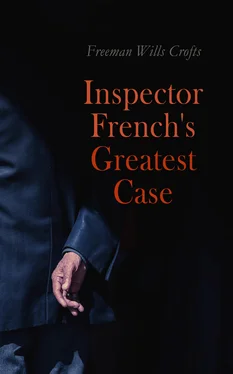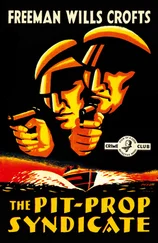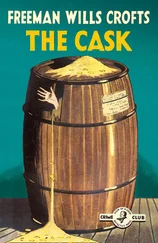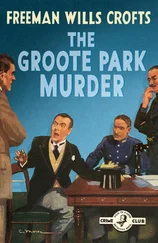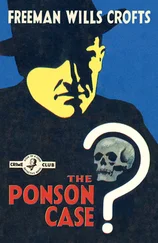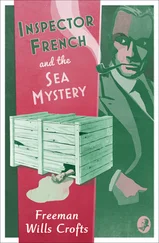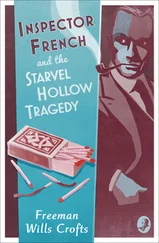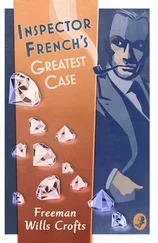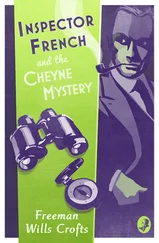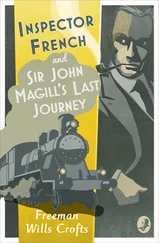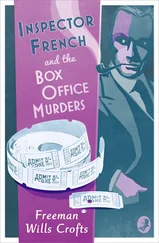“No, I never let it lie about. Even at night I kept it attached to me.”
The Inspector rose from his chair.
“Well, sir,” he said politely, “I’m sorry to have kept you so long. Just let me take your finger prints to compare with those in the safe, and I have done. Shall I ring up for a taxi for you?”
Mr. Duke looked at his watch.
“Why, it is nearly one,” he exclaimed. “Yes, a taxi by all means, please.”
Though Inspector French had said that everything possible had been done that night, he did not follow Mr. Duke from the building. Instead, he returned to the inner office and set himself unhurriedly to make a further and more thorough examination of its contents.
He began with the key of the safe. Removing it by the shank with a pair of special pincers, he tested the handle for finger prints, but without success. Looking then at the other end, a slight roughness on one of the wards attracted his attention, and on scrutinising it with his lens, a series of fine parallel scratches was revealed on all the surfaces. “So that’s it, is it?” he said to himself complacently. “Manufacturers don’t leave keys of valuable safes half finished. This one has been cut with a file, and probably,”—he again scrutinised the workmanship—“by an amateur at that. And according to this man Duke, old Gething was the only one that had the handling of the key—that could have taken a wax impression. Well, well; we shall see.”
He locked the safe, dropped the key into his pocket, and turned to the fireplace, soliloquising the while.
The fire had still been glowing red when the crime was discovered shortly after ten o’clock. That meant, of course, that it had been deliberately stoked up, because the fire in the outer office was cold and dead. Some one, therefore, had intended to spend a considerable time in the office. Who could it have been?
As far as French could see, no one but Gething. But if Gething were going to commit the robbery—a matter of perhaps ten minutes at the outside—he would not have required a fire. No, this looked as if there really was some business to be done, something that would take time to carry through. But then, if so, why had Gething not consulted Mr. Duke? French noted the point, to be considered further in the light of future discoveries.
But as to the identity of the person who had built up the fire there should be no doubt. Finger prints again! The coal shovel had a smooth, varnished wooden handle, admirably suited for records, and a short test with the white powder revealed thereon an excellent impression of a right thumb.
The poker next received attention, and here French made his second discovery. Picking it up with the pincers in the same careful way in which he had handled the key, he noticed on the handle a dark brown stain. Beside this stain, and sticking to the metal, was a single white hair.
That he held in his hand the instrument with which the crime was committed seemed certain, and he eagerly tested the other end for prints. But this time he was baffled. Nothing showed at the places where finger marks might have been expected. It looked as if the murderer had worn gloves or had rubbed the handle clean, and he noted that either alternative postulated a cold-blooded criminal and a calculated crime.
He continued his laborious search of the room, but without finding anything else which interested him. Finally, while his men were photographing the prints he had discovered, he sat down in the leather-covered arm-chair and considered what he had learned.
Certainly a good deal of the evidence pointed to Gething. Gething knew the stones were there. According to Duke, no one else could have got hold of the key to the safe to make an impression. Moreover, his body was found before the safe with the latter open. All circumstantial evidence, of course, though cumulatively strong.
However, whether or not Gething had contemplated robbery, he had not carried it through. Some one else had the diamonds. And here the obvious possibility recurred to him which had been in his mind since he had heard the Superintendent’s first statement. Suppose Orchard was the man. Suppose Orchard, visiting the office in the evening, arrived to find the safe open and the old man stooping over it. Instantly he would be assailed by a terrible temptation. The thing would seem so easy, the way of escape so obvious, the reward so sure. French, sitting back in the arm-chair, tried to picture the scene. The old man bending over the safe, the young one entering, unheard. His halt in surprise; the sudden overwhelming impulse to possess the gems; his stealthy advance; the seizing of the poker; the blow, delivered perhaps with the intention of merely stunning his victim. But he strikes too hard, and, horrified by what he has done, yet sees that for his own safety he must go through with the whole business. He recalls the danger of finger prints, and wipes the handles of the poker and of the drawer in the safe from which he has abstracted the diamonds. With admirable foresight he waits until the body grows cold, lest an examination of it by the policeman he intends to call might disprove his story. Then he rushes out in an agitated manner and gives the alarm.
Though this theory met a number of the facts, French was not overpleased with it. It did not explain what Gething was doing at the safe, nor did it seem to fit in with the personality of Orchard. All the same, though his instruction to his man to shadow Orchard had been given as an obvious precaution inevitable in the circumstances, he was glad that he had not overlooked it.
Another point occurred to him as he sat thinking over the affair in the leather-lined chair. If Orchard had stolen the stones, he would never have risked having them on his person when he gave the alarm. He would certainly have hidden them, and French could not see how he could have taken them out of the building to do so. A thorough search of the offices seemed therefore called for.
The Inspector was tired, but, late as it was, he spent three solid hours conducting a meticulous examination of the whole premises, only ceasing when he had satisfied himself beyond possibility of doubt that no diamonds were concealed thereon. Then, believing that he had exhausted the possibilities of the scene of the crime, he felt himself free to withdraw. Dawn was appearing in the eastern sky as he drew the door after him and set off in the direction of his home.
CHAPTER III
GATHERING THE THREADS
Table of Contents
The fact that he had been out all the previous night was not, in Inspector French’s eyes, any reason why he should be late at his work next day. At his usual time, therefore, he reached New Scotland Yard, and promptly engaged himself in the compilation of a preliminary report on the Hatton Garden crime. This completed, he resumed direct work on the case.
There were still several obvious inquiries to be made, inquiries which might almost be called routine, in that they followed necessarily from the nature of the crime. The first of these was an interview with the other members of the Duke & Peabody staff.
An Oxford Street bus brought him to the end of Hatton Garden, and soon he was once more mounting the staircase to the scene of his last night’s investigation. He found Mr. Duke standing in the outer office with Orchard and the typist and office boy.
Читать дальше
